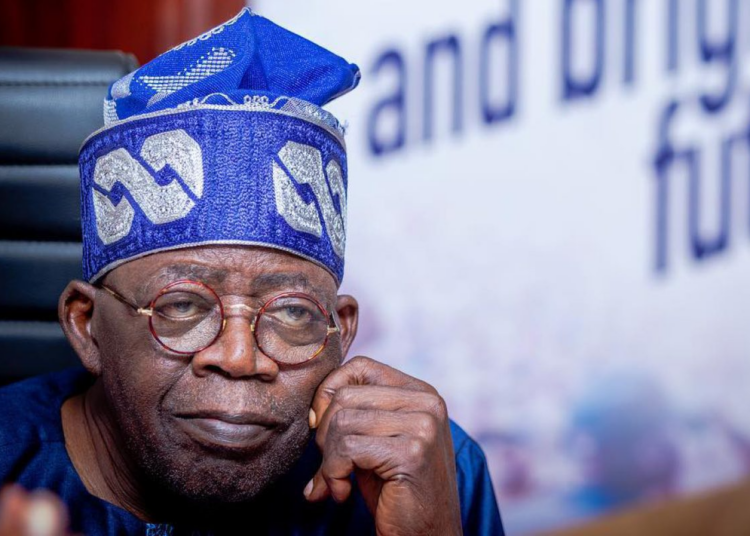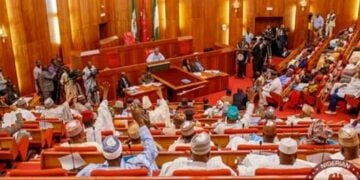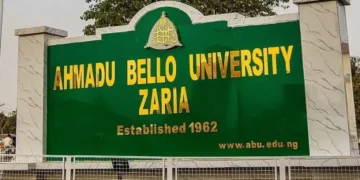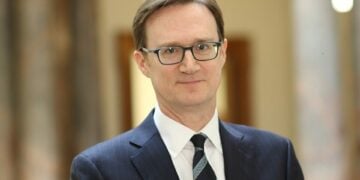Bola Ahmed Tinubu has never lost an election he contested in, whether it was for the Senate seat, governor or president. And in every election, opponents were no lightweight politicians. Some were once his mentors. In elections where the odds didn’t favour him, as was the case in 2007, 2011 and 2015, he simply backed somebody else.
But in less than 24 hours the president-elect who metamorphosed from strong man of Lagos politics to national leader of the governing All Progressives Congress (APC) will be sworn in as the nation’s 16th president and take on the title, Commander-in-Chief of the Armed Forces.
On February 25, 2023 history was made in Nigeria as the electorate elected their next president. The collective will of the Nigerian electorate was demonstrated in totality with the massive voting of the APC candidate, Tinubu, who defeated other presidential candidates.
The victory of the 70-year-old political veteran was conclusive, with 8.79m votes, putting him well ahead of main opposition challenger, Atiku Abubakar of the Peoples Democratic Party’s 6.98m votes and Labour Party candidate, Peter Obi’s 6.1m votes.
The Independent National Electoral Commission (INEC) chairman, Professor Mahmood Yakubu, who declared Tinubu winner said, “I now perform my responsibility as chief returning officer of the federation,” the INEC chair said.
 “I professor Mahmood Yakubu, hereby certify that I am the returning officer for the 2023 general election. The election was contested. That Tinubu Bola Ahmed of the APC, having certified the requirements of the law, is hereby declared the winner and is returned.”
“I professor Mahmood Yakubu, hereby certify that I am the returning officer for the 2023 general election. The election was contested. That Tinubu Bola Ahmed of the APC, having certified the requirements of the law, is hereby declared the winner and is returned.”
The feat was not a fluke; rather, it boils down to the complex issue of destiny as captured by a leading American politician, William Jennings Bryan, who lived between March 19, 1860 and July 26, 1925. Bryan said, “It is not a matter of chance, it is a matter of choice. It is not a thing to be waited for; it is a thing to be achieved.”
Tinubu first came to political limelight in 1992 when he contested for the Senate seat in Lagos West senatorial district on the platform of Social Democratic Party (SDP). His rival in the opposition party National Republican Convention (NRC) was Chief Kemi Nelson.
She would later become a close ally of Tinubu and serve as his commissioner for women and poverty alleviation between 1999 and 2003. Nelson who passed away in July 2022 was appointed executive director at NSITF under the APC government of Muhammadu Buhari.
But before joining the race for senate, Tinubu had wanted to contest for the House of Representatives seat on Lagos Island. The leader of the political group he belonged to, the Primrose led by a business tycoon, Chief Dapo Sarumi drafted him to Agege to contest the Lagos West Senatorial seat.
Before Tinubu ventured into politics, he was treasurer to Mobil Oil Nigeria where he rose to the post of executive director.
Alhaji Kola Oseni, his close associate, bought the nomination form for the Senatorial election for him and he emerged the party candidate after defeating those who ran against him at the party’s primary.
He however became more prominent because of the role he played in the struggle for revalidation of the annulled June 12,1993 presidential election, generally agreed to have been won by Chief Moshood Kashimawo Olanbiwoninu Abiola of the SDP.
Tinubu played a crucial role in the fight against the military junta led by General Sani Abacha, who toppled the interim government led by Chief Ernest Shonekan, which was put in place by General Ibrahim Babangida when he stepped aside on August 27 1993.
He was part of the National Democratic Coalition (NADECO) which was in the forefront of the revalidation of the annulled June 12 election.
Tinubu was active in the struggle and deployed his resources; subsequently he became the target of the military that forced him to flee Nigeria. While abroad he never gave up on the struggle, he was actively involved till Abacha died on June 8, 1998 and was succeeded by General Abdulsalami Abubakar.
Abubakar’s decision to return Nigeria to civil rule and the release of political detainees in detention under the Abacha regime, encouraged Tinubu and others who fled the country to return back to Nigeria.
When he came back, he participated in the transition process by joining Alliance for Democracy (AD), a political party formed by late Chief Obafemi Awolowo political disciples who were also the engine room for the NADECO struggle.
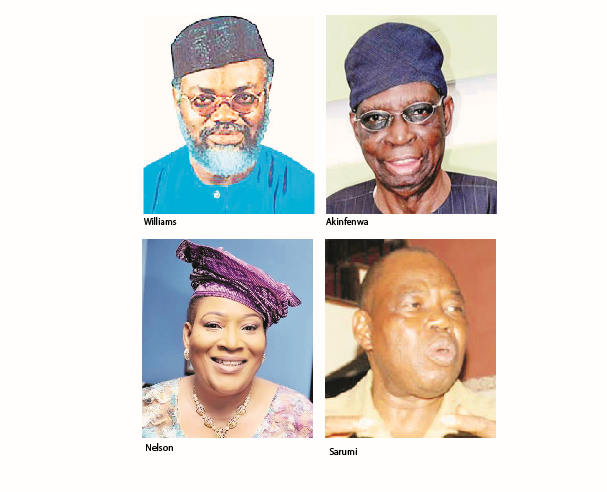
The SDP won all the three senatorial seats in Lagos State in a landslide victory because the people of the state were disposed to a democratic party rather than a republican party.
At the formation of the party, most of the leaders of Afenifere in their state subsequently emerged the gubernatorial candidate of the party but it’s leader in Lagos, Alhaji Ganiyu Dawodu was not interested in running for the post, despite entreaties and persuasion to convince him to run, he turned down the proposal and gave his support to the late Engineer Funsho Williams who was interested in running for the governorship position.
Tinubu’s initial plan was to return to the Senate, but lack of interest of Alhaji Dawodu in the post of governor, led to the leadership of the party to throw the position open to others who might be interested and because the Afenifere leaders were not disposed to Williams getting the ticket because he was tagged an Abacha politician due to his participation in the Abacha transition programme.
Afenifere leaders encouraged Tinubu to run for the post, moreso to compensate him for his commitment to the NADECO struggle. The support he enjoyed from Afenifere leaders frustrated every effort made by Alhaji Dawodu, who was the state chairman of the party to support Williams and make him emerge candidate of the party in a primary the party organised, which was supervised by Tunji Sosanya.
His nomination form was however submitted to INEC as AD acting national chairman Chief Ayo Adebanjo had to sign his nomination form at the last minute in order to meet up with the deadline set by the electoral umpire.
While AD fielded Tinubu in the 1999 general election, the opposition party, PDP fielded Prince Dapo Sarumi. It was the same Sarumi that drafted Tinubu into the senatorial race back in 1992. Now they were both going toe to toe and Tinubu would win an election that would not only shape his life, but the politics of the Southwest and that of Nigeria by slowly moving away from opposition politics and joining the mainstream.
Till today, Tinubu and Sarumi have remained on opposite ends of the political spectrum. At the height of his career in politics, Sarumi would serve as minister of information under the PDP government of Olusegun Obasanjo for close to two years.
Tinubu’s victory at that time could be ascribed to the popularity of his party, respect and influence Afenifere wielded in the South West, which made it easier for anybody fielded by the party to succeed at the poll.
Tinubu and other AD governorship candidates in the six states of the South West were voted for enmasse, because the party was sold to the electorate as an offshoot of the late sage, Chief Obafemi Awolowo ideologies and political party. Thus, the love the people of the geo political zone have for the sage was transferred to the candidates.
When Tinubu was governor of the state, he was one of those that muted the idea of setting up a forum for the Southern Governors Forum where they generated the idea of moving the region forward and foster ideas on issues that bound the southern governors together and how to have a cordial relationship with their colleagues from the North.
He became popular among his colleagues because of his desire to always render support where it was necessary.
He however did not find his ambition to contest a second term in office as governor easy as he would have expected. The opposition PDP had perfected a plan on how to oust the AD governors. A split was also emerging between him and leaders of the AD and also some members of Afenifere. But it wasn’t until after the 2093 elections that the two AD factions would go their separate ways.
The late Engineer Funso Williams was the PDP governorship candidate for the 2003 polls. Tinubu however, escaped the political onslaught to remove him from office by sheer luck. But the remaining five AD governors were not fortunate, as they lost in their bid to secure a second term to the PDP candidates, making Tinubu the only man standing.
The support given to Tinubu by the Vice president then, Alhaji Atiku Abubakar added to his success story because, he did not only divulged the plan of the PDP to him, he also guided against the perfected plan to rig him out of office.
No doubt Engineer Williams was also a strong opponent who had built a formidable political structure to give Tinubu a fight for his popularity. He also wasn’t a new face in the contest for governors. Back in 1999, Tinubu just about managed to snatch the AD ticket from him.
But this time around, Williams was running under the ruling party at the centre. He would remain a political force in the politics of Lagos until he was killed in a gun attack in 2006.
Again, political pundits believe that the resident electoral commissioner then, late Mrs. Kemi Adebiyi also had sympathy for Tinubu as she was alleged to have furnished him with information on steps to be taken by the PDP to take over Lagos.
Based on information available to him, he mobilised his lieutenants to ensure they delivered and they ensured the party emerged victorious. But the AD was no longer one family. Bisi Akande, an ally of Tinubu led one faction, while Mojisoluwa Akinfenwa led another. In the Tinubu’s faction had to pull out and formed the Action Congress. It immediately overshadowed the AD as the party the southwest identified with.
Since he was the only opposition governor left in the South West, he became the rallying figure, and played the role of a big brother to make his party relevant again, not only that, he extended a hand of fellowship across the Niger.
When leaving office in 2007, his party which has transmuted from AD to Action Congress (AC) fielded Atiku as its presidential candidate, prior to the election Afenifere, which was the bastion to AD has been polarised, ending up having three factions, a faction loyal to Tinubu led by Senator Ayo Fasanmi, another led by Chief Reuben Fasoranti, while the younger element also pulled out and formed Afenifere Youth Renewal Group led by Hon Wale Osun. The factionalisation however, affected the chances of AC in the presidential election.
Also it was alleged that Tinubu tactically withdrew his support for Atiku, when the latter failed to pick him as his running mate and opted for Senator Ben Obi instead of him.
After leaving office as a governor in 2007, he engaged himself in building a formidable political party and rendering assistance wherever there was perceived injustice and electoral robbery.
He contributed to taking over some states from the PDP through the courts by providing the resources to execute cases challenging electoral fraud and retrieved states like Edo, Ondo, Osun and Ekiti from the opposition party to the kitty of AC, Action Congress of Nigeria (ACN).
His critics noted that the states got back because the judiciary was arm-twisted rather than being based on the merit of the petitions filed by ACN and Labour Party in the case of Ondo State.
As at that time, the law provided that the state election petition ends at the Court of Appeal. This was in line with the constitutional provision. It was alleged that Tinubu and his cronies had an ally in the President of the Court of Appeal Justice Ayo Salami who was disposed to do their bidding and that was why the judiciary ruled in their favour.
Based on the alleged fraternity between the ACN members and Justice Salami, the opposition party, the PDP petitioned the National Judicial Council to investigate the allegation against Salami and call logs of conversation between him and the ACN members were obtained to substantiate the allegation.
Due to the petition against Salami and face -off between him and the Chief Justice of Nigeria Aloysius Katsina-Alu, he was eventually placed on suspension based on the recommendation of the Nigerian Judicial Council NJC, according to recommendation of the committee set up to investigate allegation, which was led by Justice Ibrahim Auta. The suspension lasted till the time he was due for retirement.
By this time, Tinubu already had his sights on expanding his political base and the party platform that made all the politics possible.
He was among those that prompted the idea of the opposition parties to coalesce and form a strong formidable political party and that was the only way the PDP domineering influence could be challenged.
The decision of ACN, Congress of Political Change (CPC), All Nigeria People’s Party (ANPP), part of All Progressives Grand Alliance (APGA) and a splinter group in the PDP came together to form All Progressives Congress (APC) in the build up to 2015 general election.
The idea paid off as the PDP presidential candidate President Goodluck Jonathan was defeated, making history as it was the first time an incumbent president would be defeated. The APC candidate Muhammadu Buhari emerged winner of the election.
Buhari had previously contest for president on three occasions but was unsuccessful. Success however beckoned the moment be came to an understanding with Tinubu to form a broader political tenet, essentially an alliance between the north and the southwest.
Long before he uttered the words, ‘emi lokan’, it was widely rumored he would seek to succeeded Buhari who second term was due to end on May 29, 2023. He was however always going to engage in an epic political battle for the APC ticket from the very moment he declared his interest in the presidential election.
It started with the feisty and bitter presidential primary of the All Progressives Congress. He faced formidable opponents for the party’s ticket including Vice President Yemi Osinbajo, Senate President Ahmed Lawan, Dave Umahi and Rotimi Amaechi.
While Lawan represented attempts by the north to retain power. Osinbajo represented clamour for a Christian president and Amaechi, the voice of the south south. Umahi represented an even stronger clamor for a southeast president.
As far as many observers are concerned, it was President Buhari’s resolve to be neutral and democratic by refusing to impose any candidate and the immense support from northern APC governors that made Tinubu the clear favourite in the southern geopolitical zone to clinch the ticket.
In the grand finale of the election, candidates in the election were from the north, the east and the west. Tinubu had chosen a Muslim running mate. Obi emerged as a dark horse and had the southeast solidly behind him and appealed to Christian voters.
Atiku, a veteran contestant, was banking on northern votes. Like opponents Tinubu faced in the past; they proved no match for him and he emerged winner fulfilling a lifelong ambition
With this arrangement, the Minister of Works and Housing, Babatunde Fashola said the three major opposition candidates in the presidential election actually helped ensure victory of the President-elect, Asiwaju Bola Tinubu.
Fashola noted that Obi, Atiku, and Kwankwaso gave Tinubu the victory when they refused to form an alliance ahead of the election.
According to him, it is the inconsistencies within the PDP that saw Tinubu emerge as winner of the 2023 presidential polls.
He said, “Politics is a game of numbers and numbers have arithmetic equations – additions and multiplications. APC was adding and multiplying. Some PDP governors – Cross River, Ebonyi, Zamfara – had come to join APC. PDP was dividing and subtracting.
“So, the major contenders against us in this election – NNPP, PDP, Labour Party, their candidates, were in the same party in 2019. They lost by almost four million votes. So, having now divided that inadequate, insufficient ticket into three, how was it going to add up into an electoral victory?
“So, they handed away the presidential ticket by dividing their powers. Not only did they divide, they now subtracted with the G5 governors. So, it was bad mathematics.”
What Fashola did say is that Tinubu has spent his political adding and building alliances. And unlike the sage Obafemi Awolowo and some leaders of Afenifere, he was not satisfied with the southwest playing the role of opposition in Nigeria’s. His ambition to be president would have it.

